If taking pictures is your passion, then the idea of earning a photography degree online might spark your interest in college classes.
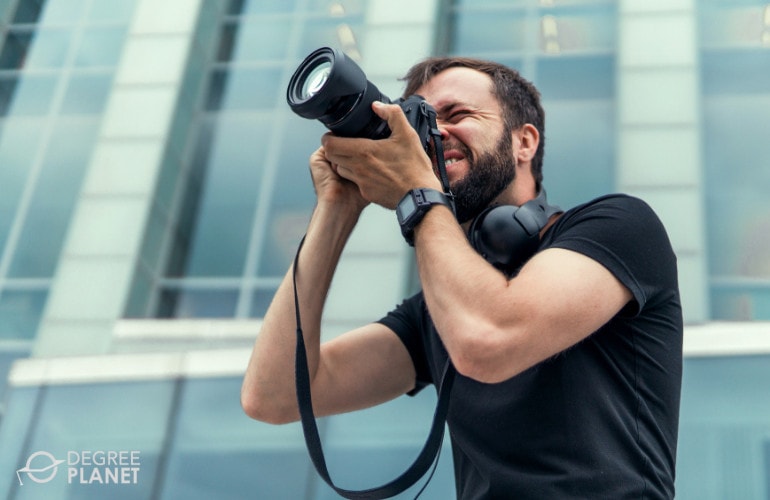
Many people make careers out of photography, and those who have invested in college coursework may find themselves at an advantage in this competitive field.
Editorial Listing ShortCode:
Photography school could help prepare you for a career in journalism, art, industry, or another sector. Through college courses, you can increase your technical knowledge of photography while also fostering your love of this art form.
Photography Degrees Online

Yes, you can major in photography in college! If you love taking pictures, then a digital photography degree could be a good fit for you.
You might think that you already know a lot about how to take nice pictures. Even still, a college program in photography could be a great asset as you prepare for a career in this field. Topics you might study in a photography program include:
- Art and photography history
- Business practices
- Color theory
- Communication
- Digital photography
- Editing software
- Lighting
- Storytelling
- Visual composition
Your school may offer its photography degree as a Bachelor of Fine Arts (BFA), a Bachelor of Arts (BA), or a Bachelor of Science (BS).
Editorial Listing ShortCode:
The BFA usually has more art classes and fewer general education courses. BA and BS programs tend to have a more even mix of general education and major-specific classes. You might get to select several electives from areas that are of interest to you. You can often choose topics that are relevant to your future career plans. Elective options could include classes on art history or other artistic disciplines.
Some programs include options for internships. They can put you in touch with local organizations where you could learn from industry professionals. As you study for a photography bachelor’s degree online, you can assemble a portfolio, which is a collection of your work. You can show your portfolio as you apply for internships or jobs, and a strong portfolio could give you an advantage over other applicants.
After graduation, you could seek employment with a company or try self-employment. Different types of professional photography include wedding, family portrait, commercial, or journalistic photography. Other jobs graduates might consider include video camera operation, web design, or graphic design.
Common Photography Specializations

Some schools offer general photography programs, while others provide students the opportunity to specialize in a particular discipline.
You might get to choose a concentration track for your photography major or earn a certificate in that area. Some schools may even offer full degree programs specifically geared toward your area of interest.
Aerial Photography
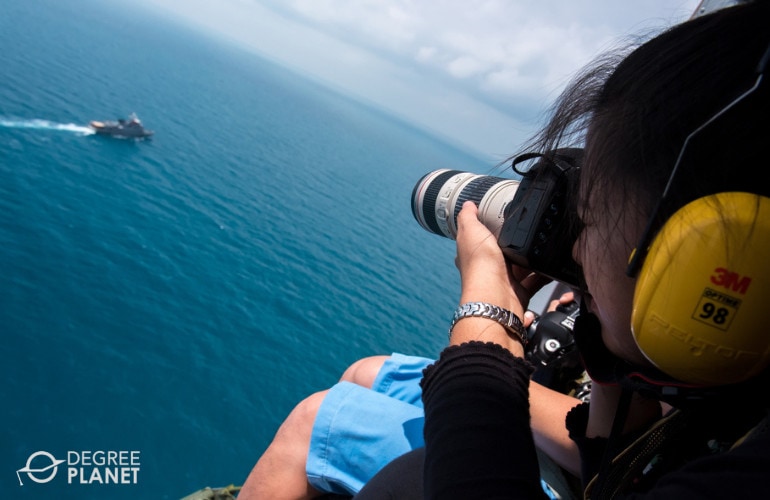
Shooting images from high above is known as aerial photography. These days, aerial photography is often done with drones.
If you study aerial photography in college, you’ll learn about unmanned aircraft systems and how to use them for capturing vertical and oblique images. Your coursework can also introduce you to geographic information systems (GIS) that are used for identifying locations.
Of course, you’ll learn photography techniques, too. You can study how to operate still cameras and video cameras and how to edit your images. During lab sessions, you can gain hands-on practice. Industries that hire aerial photographers include real estate, journalism, urban planning, and defense.
Commercial Photography

Commercial photographers take pictures for business uses. Depending on the project, they may take images of objects, people, or landscapes.
In addition to basic photography courses, you might spend extra time studying lighting concepts. Commercial photographers often take indoor photographs and need to know how to best light their subjects. Lighting studies are also useful for outdoor photography.
Because commercial photographers often work in business settings, this degree track may include business-focused studies. You might study how to prepare a quote, establish a contract, and work with creative teams. Commercial photographers are frequently hired for advertising, marketing, or real estate projects.
Fine Art Photography
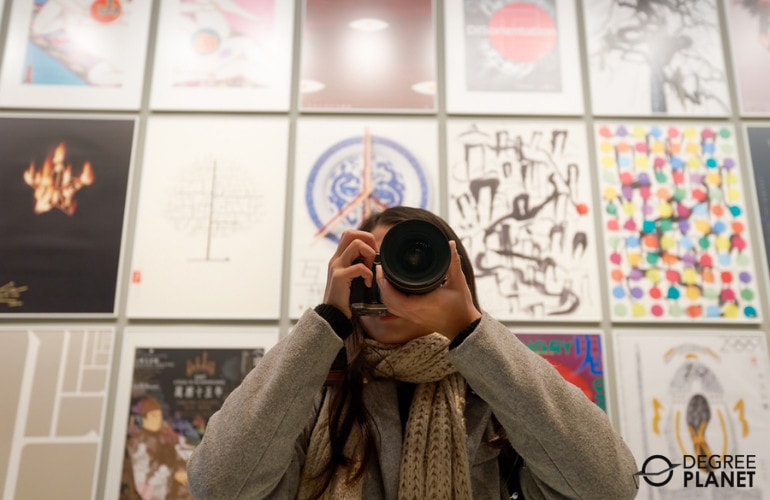
Fine artwork often hangs in galleries and museums, and photography is a modern medium for creating fine art pieces. As a fine artist, you could develop your own style and vision for your body of work. Your college coursework might allow you to experiment with different techniques as you explore various directions.
Fine artists often learn from those who have gone before them. Studying art history may be a key part of your curriculum. Visiting galleries and museums could also be part of your college experience. Many fine art photographers are self-employed artists who enters pieces in exhibitions.
Photojournalism
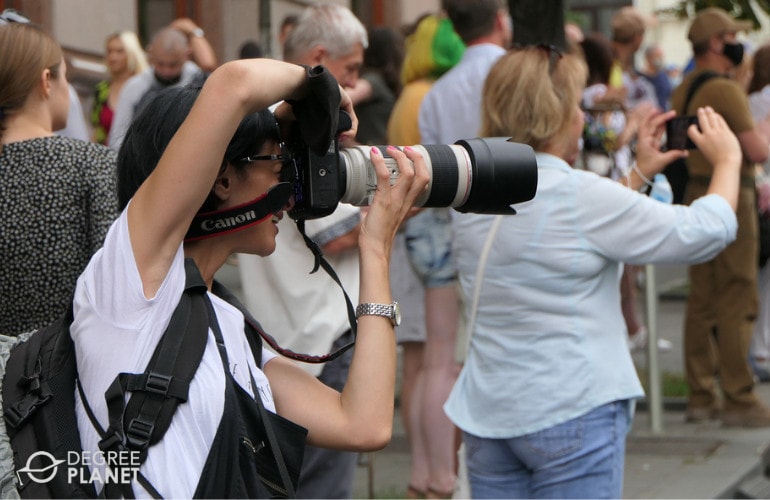
Photojournalists use photography to tell stories and document events. To prepare you for that career, photojournalism programs offer training in photography techniques as well as journalism principles.
In your photography courses, you’ll study how to capture both still and moving images. You can also learn how to edit your photos and videos. Journalism courses may address mass communication, storytelling, media history, and copyediting. You might study specific forms of journalism, such as sports reporting and political coverage.
Editorial Listing ShortCode:
Photojournalists are often freelance workers. They may provide videos or images for news outlets, including newspapers, magazines, or websites.
Portrait Photography
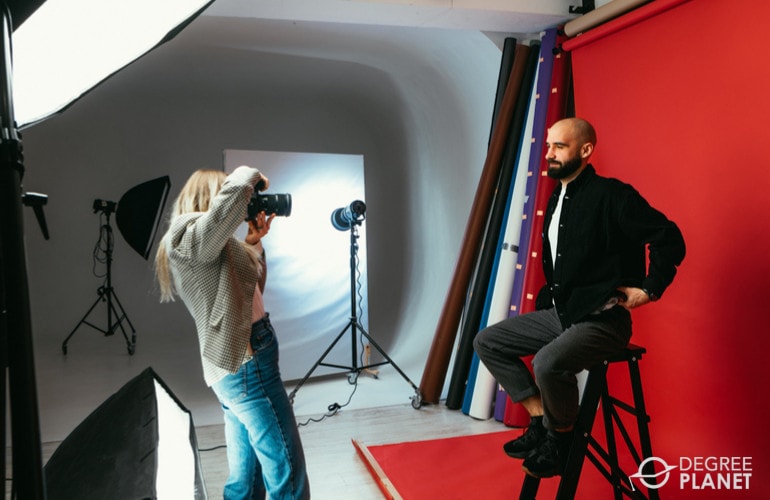
Photographers who specialize in portrait images take photos of groups or individuals. They often capture family memories or special occasions.
In a portrait photography program, you can learn how to arrange your subjects and light them properly. You may discuss how to tell a story through your images. The classes might also provide tips on various portrait niches, such as shooting weddings or newborn babies.
There could be business-focused classes, too, that teach you how to run a professional photography business. Portrait photographers can be self-employed, or they can work for studios. This degree could also be useful in fashion photography.
Photography Careers and Salaries
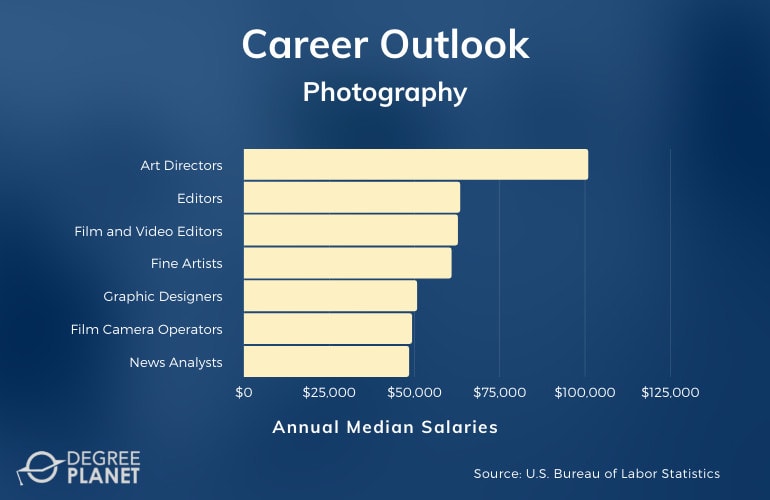
Professional photographers can choose from a wide variety of specialties. Some take portraits of babies or families, while others focus on event photography, such as shooting pictures at weddings.
Photographers may prefer to focus on non-human subjects. The field of commercial photography deals with taking pictures for business purposes. That could include creating product images to be used in advertisements. Taking photographs from above allows for interesting or informative shots. Some photographers specialize in aerial photographs captured from inside airplanes. Others use drones in their work.
Photos are also needed in journalism. These pictures may be published in newspapers, magazines, or online. Photographs can also be used as illustrations in books, whether children’s picture books or scientific texts. Photographers can be fine artists, too, and their artwork may be displayed in galleries or museums.
According to the Bureau of Labor Statistics, photography is a fast-growing profession with an annual median salary of $38,950.
| Careers | Annual Median Salaries |
| Art Directors | $100,890 |
| Editors | $63,350 |
| Film and Video Editors | $62,680 |
| Fine Artists | $60,820 |
| Graphic Designers | $50,710 |
| Television, Video, and Film Camera Operators | $49,230 |
| News Analysts, Reporters, and Journalists | $48,370 |
| Museum Technicians and Conservators | $47,630 |
| Photographers | $38,950 |
| Craft Artists | $35,930 |
Photographers may work for a company or be self-employed. Some work full-time, and others work part-time. Not all photography majors stick with still photography. Some choose to work as video camera operators in the television or movie industries. Another option is to be a videographer who captures footage of weddings and other special events.
Some photography professionals also become film editors. In addition, graduates can apply their college lessons in jobs that don’t involve being behind a camera. The skills learned in this program could be useful for roles in graphic design or web design. Working at an art museum might be another possibility.
Photography majors may have advancement opportunities as well. Some go on to become art directors who supervise artistic projects. They might work closely with a team of photographers or decide which images to include in a project.
Editorial Listing ShortCode:
Photographers with a background in journalism might move into editing roles. Magazine editors, for example, often attend photoshoots and select pictures to accompany articles, so photojournalism experience could be valuable for that role.
Photography Bachelor Degree Curriculum & Courses
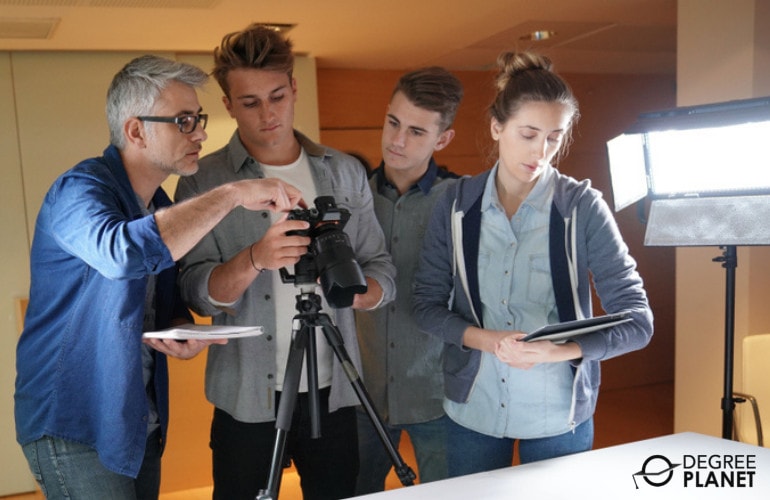
You’ll take a mix of classes during college. Some can help you be a better photographer, while others can prepare you for working in the photography industry. Here are some examples of course that often appear in a photography program:
- Art History: Over one or more semesters, you’ll study developments and milestones in art, from ancient eras to the present day.
- Business Decisions: Studying pricing, contracts, brand management, and other business principles could help you turn a profit in this industry.
- Color and Composition: A course on two-dimensional art often addresses color theory, design principles, and aesthetics.
- Darkroom Photography: Although most photography is digital these days, you may still learn about traditional film techniques.
- Digital Photography: This class teaches you to operate digital cameras, use editing software, and print your work.
- Photography History: You’ll study precursors to photography, the early years of this medium, developments since that time, and how photography has changed the world.
- Portfolio: During this class, you might select the best images for your portfolio and arrange them in an attractive collection.
- Storytelling: A class on narratives can develop your ability to tell stories through your photographs.
- Studio Work: This course focuses on principles for indoor photography, such as backgrounds and lighting.
- Video: You’ll learn the basics of video camera operation and explore filming techniques and storytelling tips.
The curriculum is likely to vary from school to school, and different concentrations will include different courses.
Bachelor of Photography Admissions Requirements

If you want to earn a photography degree, it’s necessary to apply to colleges with photography majors. In addition to a form and a fee, common application requirements include:
- Official high school transcripts
- Personal statement or writing sample
- Letters of recommendation or contact information for references
- SAT or ACT scores (not a requirement at all schools)
Some colleges require a separate application process for admission to the art department. For that, you might be asked to submit a portfolio of your work.
Online Photography Degree Programs Accreditation
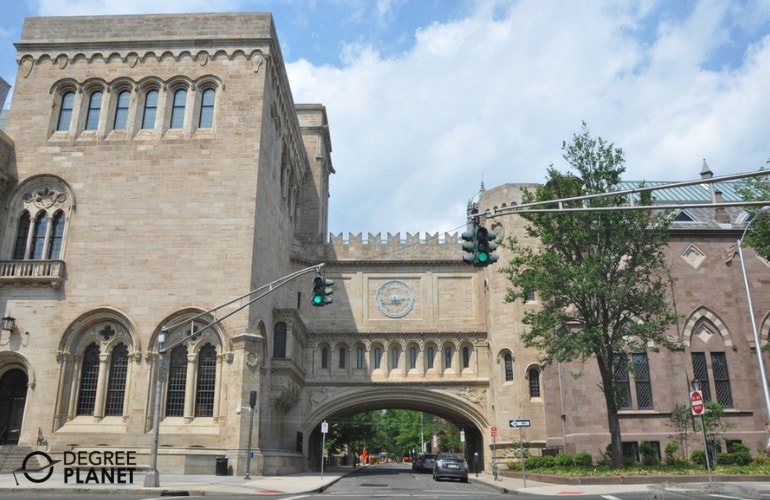
Photography is a legitimate college major. If you’re going to invest in photography training, it’s strategic to earn your credentials from a reputable institution.
It could be beneficial to only consider schools that hold regional accreditation. Even photography schools online can qualify for that status. You can benefit from a regionally accredited college education in several ways. For instance, if you switch programs or colleges, accredited coursework is more likely to transfer.
Editorial Listing ShortCode:
Other credible universities might also consider you as a candidate for their master’s degree programs. Plus, employers often prefer candidates who have been well-trained at an accredited school and are prepared for the workforce.
Financial Aid and Scholarships
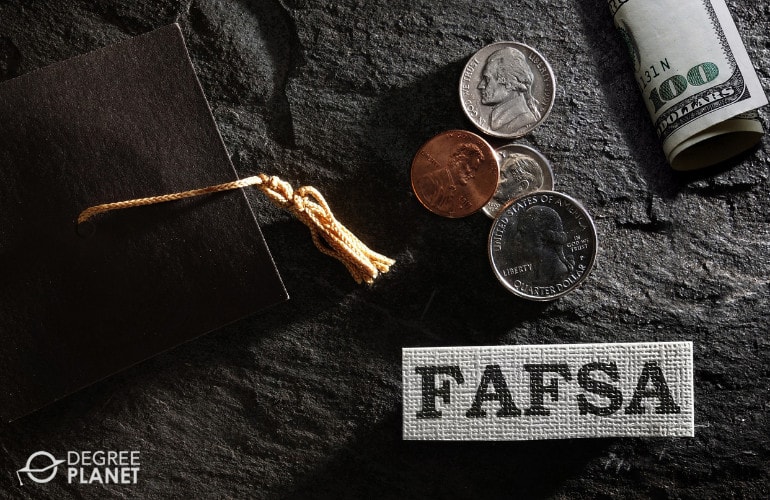
While a photography degree is beneficial, it’s not always cheap. Fortunately, financial aid programs are designed to help students achieve their college goals.
Most students start with government aid. You can apply for it through the Free Application for Federal Student Aid (FAFSA). Many students qualify for loans. You might even get grants, too. In addition to federal programs, your state may also give grants and loans to students who qualify.
Scholarships are another aid option to explore. Institutional scholarships come directly from the college, but other organizations offer scholarship programs as well. The more scholarships you apply for, the higher chances you have to win one. You may also want to look into workplace-based assistance. Some employers help pay for their team members to take college classes.
Do You Need a College Degree to Be a Photographer?

In most industries, you can get away with being a photographer without a college degree. That doesn’t mean that a photography degree isn’t valuable, though.
In a college program, you can learn technical information about photography, and you can also develop your artistic eye for knowing what makes a good image. Employers who see college studies on your resume may feel more confident about your training and abilities.
Also, according to the Bureau of Labor Statistics, some photography positions do require a bachelor’s degree. For example, news outlets usually prefer to hire photojournalists with degrees. College studies may help you launch a career in scientific photography, too.
Is Photography a Good Career?
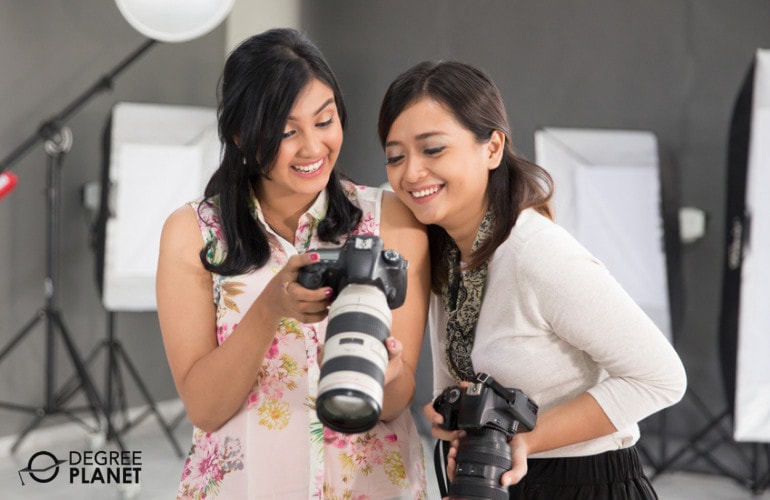
Yes, photography is a good career for many professionals. Bureau of Labor Statistics data shows that the median salary for photographers is $38,950 per year.
Photography is often a flexible career where you can set your own hours. Some photographers even maintain part-time schedules. If you want a career that fits around other responsibilities, then photography might be a good fit for you.
With photography, you can also choose your area of specialty. Your preference might be wedding portraits, fashion images, or news videos. You could even study photography in hopes of establishing yourself as a fine artist.
Can You Major in Photography?
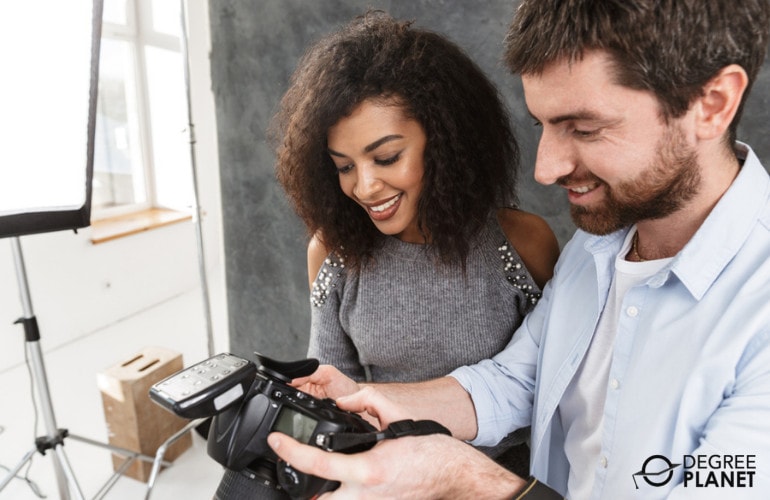
Yes, there are colleges that offer photography degree programs to prepare students for jobs in this field. Photography students typically study art history, visual composition, narrative practices, and business principles. During their time in school, they often assemble portfolios of their work.
There are even online photography degrees for students who want to study without commuting to a college campus. You could use your own digital photography and lighting equipment to practice the skills you learn in the virtual classroom. Online courses also provide a convenient environment in which to learn how to work with editing software.
How Much Do Photography Majors Make?
According to the Bureau of Labor Statistics, the median annual salary for photographers is $38,950. Most earn between $24,540 and $77,760 per year. The highest wages are usually available in the broadcasting and publishing industries.
Editorial Listing ShortCode:
Photographers with experience may eventually become art directors. That’s a role with a median annual salary of $100,890. Data from the Bureau of Labor Statistics shows that most art directors earn between $57,220 and $194,130 each year. The motion picture and advertising industries pay the highest salaries for art directors.
What Can I Do with a Photography Degree?
If you want to take pictures for businesses to use in their promotions or online listings, then you might consider a career in commercial photography. Other branches of photography with a business focus include aerial photography and fashion photography.
Portrait photographers help people preserve their special memories. As a portrait photographer, you might take pictures of high school or college seniors, newborn babies, or extended families. Photojournalism is another potential career path. Photojournalists often take videos or photos for news outlets. Through those images, viewers can connect with faraway places or learn about current events.
How Long Does It Take to Get a Bachelor’s Degree in Photography Online?

A bachelor’s degree in photography is usually a 120 credit program. At a traditional, on-campus college, it will generally take 4 school years to complete a bachelors with full-time enrollment.
Online photography degrees may offer the opportunity to finish sooner. Sometimes, online students take year-round courses, with each class lasting just 6 weeks or 8 weeks. By taking back-to-back classes full-time, it’s possible to complete a bachelor’s degree in less time than normal.
Editorial Listing ShortCode:
Transfer credit may help you get through college even more quickly. Colleges often accept coursework from other regionally accredited schools. in fact, some students enter their bachelor’s program with an associates degree in photography, which may reduce the time to complete their bachelor’s to just 2 additional years.
What’s the Difference Between BFA vs. BA in Photography Programs?
Some art students earn a Bachelor of Fine Arts (BFA), while others choose to get a Bachelor of Arts (BA).
| BFA in Photography | BA in Photography |
|
|
A BA may allow you the time to pursue a double major or a minor.
Is a Degree in Photography Worth It?

Yes, a degree in photography is worth it for many professionals. According to the Bureau of Labor Statistics, photography jobs are expected to experience 17% job growth over the next ten years.
While much of the current increase stems from post-COVID rehiring, there will be a need for photographers for years to come. Even if job growth slows, holding a degree in photography might help you showcase your qualifications.
Editorial Listing ShortCode:
One of the joys of working as a professional photographer is the opportunity to turn your passion into a career. You can spend your days capturing well-crafted images or helping people preserve their memories.
Universities Offering Online Bachelors in Photography Degree Program
Methodology: The following school list is in alphabetical order. To be included, a college or university must be regionally accredited and offer degree programs online or in a hybrid format.

The Academy of Art University offers an online program for a Bachelor of Fine Arts in Photography. It aims to help students develop their individual styles and learn how to build portfolios. Coursework includes History of Photography, Visualization, Art History Through the 15th Century, Quality of Light, Social Media Content Development, and more.
Academy of Art University is accredited by the Western Association of Schools and Colleges.

Arizona State University offers an online program for a BFA in Art – Digital Photography. It consists of 40 classes that are each 7.5 weeks long. Students in the program are given opportunities to build portfolios and create artist statements to help them in the job market. ASU currently requires applicants to provide test scores for scholarship consideration and class placement.
Arizona State University is accredited by the Higher Learning Commission of the North Central Association of Colleges and Schools.
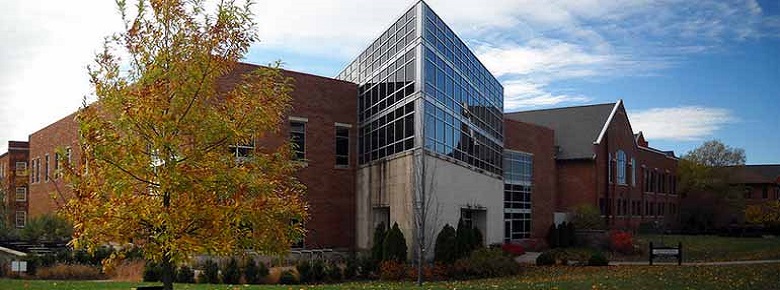
Columbia College offers an in-person BFA in Photography program. Columbia uses a traditional 16 week semester calendar. Students in the program are given opportunities to exhibit their work in Columbia’s galleries. Columbia provides small class sizes and an immersive learning environment. Some classes are available online.
Columbia College is accredited by the Southern Association of Colleges and Schools Commission on Colleges.

Liberty University offers a BS in Digital Design – Photography. The program features 100% online, 8 week courses, such as Digital Imaging, Strategic Communication, and Art, Culture, and Technology. Students also have opportunities to participate in practicums or internships. The average student takes 3.5 years to finish.
Liberty University is accredited by the Southern Association of Colleges and Schools Commission on Colleges.
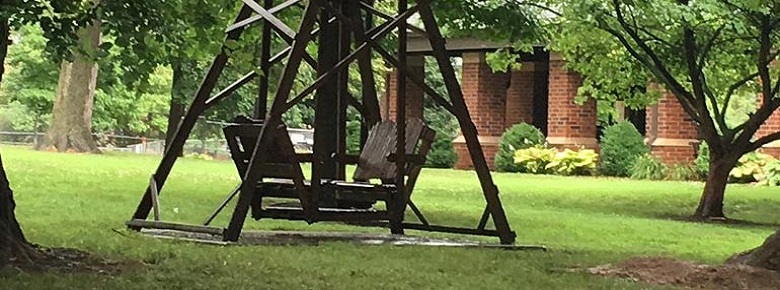
Lindenwood University offers an Art and Design BFA with an emphasis in Photography. The program is designed to provide a strong foundation in design principles that can be applied in all visual arts. Students in the program are given opportunities to build professional portfolios and earn Adobe certifications. The degree can be earned on campus or online.
Lindenwood is accredited by the Higher Learning Commission.
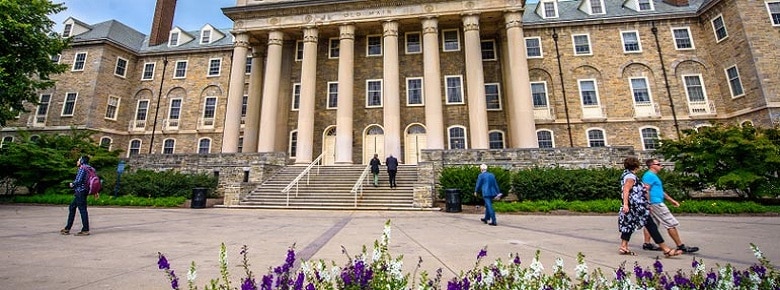
Pennsylvania State University offers a Bachelor of Design in Digital Multimedia Design. The university has digital cameras for rent, or students may purchase their own. Coursework includes Digital Arts: Computer Graphics, Basic Photography for Communications, Foundations of Human-Centered Design and Development, and more.
The Pennsylvania State University is accredited by the Middle States Commission on Higher Education.

The Rocky Mountain College of Art and Design offers an online program for a Bachelor of Fine Arts in Photography. The curriculum includes studies in lighting, digital imaging, visual storytelling, and more. Students can choose to specialize in Photojournalism and Documentary or Commercial Photography. Online students are given opportunities to collaborate and receive feedback from others.
Rocky Mountain College of Art and Design is accredited by the Higher Learning Commission.

Savannah College of Art and Design offers both a BA and a BFA in Photography. Both programs are available online and at two different campus locations. Students are given opportunities to create portfolios and gain real-world experience through internships. Coursework includes Design I: Elements and Organization, Color: Theory and Application, Camera Exploration and Technique, and more.
The Savannah College of Art and Design is accredited by the Southern Association of Colleges and Schools Commission on Colleges.

Southern New Hampshire University offers a Bachelor of Arts in Digital Photography that can be earned 100% online. Students in the program study marketing and business skills in addition to photography. Courses options include Media Communication and Visual Literacy, Photographic Practice in the Digital Age, Digital Narratives and Documentary, and more.
Southern New Hampshire University is accredited by the New England Commission of Higher Education.

The University of West Georgia offers an on-campus program for a Bachelor of Fine Arts with a Major in Art, Photography. The interdisciplinary curriculum gives students opportunities to explore related fields, such as graphic design and painting. Coursework includes Non-Western Art, Darkroom Photography, Digital Imaging, and more. Internships are also available.
The University of West Georgia is accredited by the Southern Association of Colleges and Schools Commission on Colleges.
Getting Your Bachelor’s in Photography Degree Online

Do you love to take photos or capture videos? If so, you might think about turning your hobby into a profitable career.
College could be the first step to becoming a professional photographer. In university classes, you can learn about composition, design, color, lighting, and editing. You might also gain a foundation of business principles for career success. Online college courses are an option for aspiring photography professionals.
If you choose an online program from an accredited school, you can use your own photography equipment to put your classroom lessons into practice. The assignments you complete can help develop your skills just like on-campus projects would.
Why not start exploring your options for an accredited online photography degree today?

